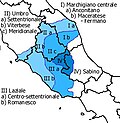the subjunctive by attraction is the situation when the verb in a relative clause or a temporal clause that is closely dependent on a subjunctive verb...
10 KB (1,315 words) - 21:29, 25 January 2025
Latin syntax (redirect from Latin subjunctive)
it were an ordinary indicative verb. Often in English the subjunctive can be translated by an infinitive; for example, imperāvit ut īret (literally, 'he...
71 KB (9,611 words) - 14:14, 21 January 2025
Latin tenses (section Subjunctive)
main tenses of the indicative mood, there are four main tenses in the subjunctive mood and two in the imperative mood. Participles in Latin have three...
208 KB (27,809 words) - 09:56, 22 June 2025
and most subordinate verbs in indirect statements use the subjunctive mood. Subjunctive mood tenses are divided into two groups, primary (present and...
89 KB (12,043 words) - 03:43, 27 June 2025
the present subjunctive sim, sīs, sit. In poetry the subjunctive fuam, fuās, fuat also sometimes occurs. An alternative imperfect subjunctive is sometimes...
90 KB (6,949 words) - 13:02, 15 June 2025
to be written by you." In late classical and Medieval Latin, the ACI gradually gave way to a construction with quod with the subjunctive. Iūlia dīcit quod...
5 KB (710 words) - 16:37, 17 March 2025
expresses concepts similar to those of the English prepositions from; with, by; and in, at. It is sometimes called the adverbial case, since phrases in the...
10 KB (1,056 words) - 00:31, 31 May 2025
original meaning, is a figure of speech in which a phrase is made discontinuous by the insertion of other words. In modern usage, the term is also used more...
21 KB (2,590 words) - 11:46, 7 May 2025
Latin tenses with modality (category Articles covered by WikiProject Wikify from January 2025)
sentence, the imperfect subjunctive vellem is used to wish for something that cannot now come true, while the present subjunctive velim leaves open the...
50 KB (5,825 words) - 17:24, 3 January 2025
languages. In Antiquity and during the Middle Ages they were usually represented by Roman numerals in writing. Latin numeral roots are used frequently in modern...
35 KB (2,486 words) - 17:53, 24 September 2024
there are four tenses in the subjunctive mood, and two in the imperative. Further tenses can be made periphrastically by combining participles with the...
91 KB (6,064 words) - 19:11, 28 April 2025
a declension. There are five declensions, which are numbered and grouped by ending and grammatical gender. Each noun follows one of the five declensions...
87 KB (5,324 words) - 08:29, 23 May 2025
enemies". A common feature of Latin is hyperbaton, in which a phrase is split up by other words: Sextus est Tarquinius "it is Sextus Tarquinius". A complicating...
77 KB (10,659 words) - 07:20, 16 May 2025
some general conditions the subjunctive mood is used in the protasis. Ideal and unreal conditionals use the subjunctive in the protasis, and usually...
67 KB (9,204 words) - 17:05, 21 October 2024
'subjunctive' mode for reported questions. In reports of statements or ideas and in statements of facts known by others, the subject is represented by...
28 KB (1,385 words) - 16:59, 18 April 2025
conjunction is cum, it is in the subjunctive. But if the clause is part of indirect speech, the verb is nearly always in the subjunctive mood. The conjunctions...
101 KB (13,915 words) - 20:51, 18 October 2024
The term alliteration was invented by the Italian humanist Giovanni Pontano (1426–1503), in his dialogue Actius, to describe the practice common in Virgil...
62 KB (7,804 words) - 11:27, 21 May 2025
Seneca's letters. Every long sentence can be divided into sections called by the Greek word cola (singular colon), in Latin membra (singular membrum);...
24 KB (3,336 words) - 16:53, 2 July 2024
/nəkloˈnɛnijɐ/) shared by most other European languages – indicative (изявително, /izʲəˈvitɛɫno/) imperative (повелително /poveˈlitelno/), subjunctive (подчинително...
114 KB (12,990 words) - 10:12, 27 June 2025
circumstances, may have two high tones in adjacent syllables. In the subjunctive tí-téngésé 'we should sell', both tí and té- have underlying high tones...
8 KB (1,002 words) - 06:03, 16 May 2025
grammar, and helped to distinguish singular adjectives from plural and subjunctive verbs from indicative. No other work prior to Chaucer's is known to have...
61 KB (7,738 words) - 12:48, 23 June 2025
Agreement (linguistics) (section By category)
wast, thou hadst, thou couldst Note also the agreement shown by to be even in the subjunctive mood. However, for nearly all regular verbs, a separate thou...
32 KB (4,152 words) - 14:44, 19 June 2025
with it the anticipated consequences. In this wider sense, the term "subjunctive conditional" is sometimes used instead of "counterfactual conditional"...
120 KB (13,707 words) - 20:46, 19 June 2025
three persons. There are two moods: indicative and imperative but no subjunctive. There are two tenses: the present, which is used to express future events...
51 KB (5,794 words) - 22:10, 13 June 2025
English articles (category Determiners by language)
(1894). "English Words which hav Gaind or Lost an Initial Consonant by Attraction". Transactions of the American Philological Association. 25: 111. doi:10...
23 KB (2,863 words) - 13:39, 25 April 2025
Infinitive (Ancient Greek) (section The infinitive in subordinate clauses introduced by conjunctions)
are present also in the use of finite moods as the imperative and the subjunctive and even the optative of wishes in independent clauses. So, in cases...
57 KB (5,705 words) - 23:36, 24 March 2025
Another peculiarity appears in the third person plural of the imperfect subjunctive in the Marinese dialect (the endings '-ino' and '-ono' are still used...
48 KB (4,603 words) - 19:05, 19 February 2025







